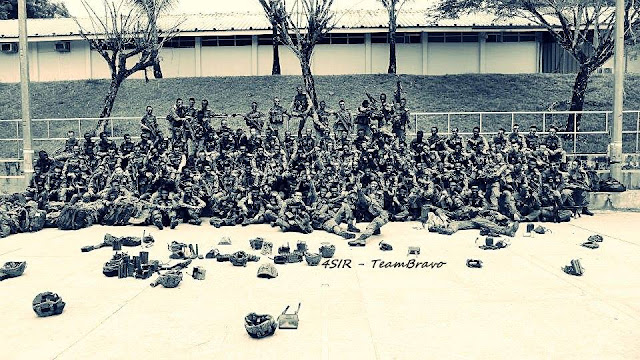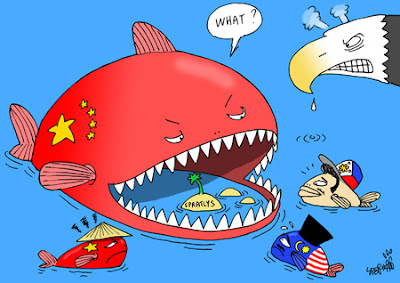Worthwhile Endeavour, Meaningful Journey, Wonderful People
By YC Choy via FB, Sunday, January 24, 2016SAF Sharing Session
23 Jan 2016
MAJ Choy Yong Cong
Good afternoon distinguished guests, fellow soldiers, parents, and students,
MAJ Choy Yong Cong
Good afternoon distinguished guests, fellow soldiers, parents, and students,
First, let me express my gratitude for the privilege to share my experience here today. I’ve heard you are the best students in your cohort. It is rare that you have so much talent, ability, and drive congregated in one room. As I look at all of you, so young, so carefree, with the world at your feet, and the possibilities ahead of you, I wish I were 17 once again. For the parents, I congratulate you (in advance) to have raised such good children… and I’m sure they will remain good to you in the future. Indeed, I am humbled to be in all your company today.
I am humbled because my presence on this stage is pretty unlikely. When I was around your age, I had bigger problems than thinking about what to do with my life. My father had left the family, kicking my mum and me out of the house, and leaving us without a home. My mum had to work day and night to make sure we had a place to stay, food on the table, and that I could focus on my studies. All she said was: 不管怎么样, 尽力就好。No matter what happens, always try your best. But I wasn’t always the best student around. I was often late for school, climbing over or under the gate to avoid getting caught. My only saving grace was that I took my mum’s advice – I worked really hard.
Along the way, I met many kind-hearted people who paved the way for me to be here today. My teachers gave me so many second chances when they could have easily condemned me. Unlike you, I was never a top student or invited to scholarship tea sessions. But when I entered the Army, I met mentors who recognized my ability and potential, and pushed me for a scholarship. Indeed, one of them is here today – his name is Jin Kiat – and he has seen me mature in the past 12 years – hopefully for the better. As the story goes, I was offered the scholarship, I took it, and as they say, the rest is history.
WHAT IS THE SINGAPOREAN WAY OF LIFE?
I share this personal story because people often ask me – what are you defending? What are you protecting? And I say, it is the Singaporean way of life. But what is our way of life? Does it matter if we are the 14th state of Malaysia, the 35th province of Indonesia, or the 51st state of America? What is it? Yes, it is the food we love – the Chicken Rice, the Nasi Lemak, and the Murtabak. It is the places we love – our Marina Bay, our hipster cafes, our homes – the Bukit Timahs and the Ang Mo Kios. It is the people we love – our families, our friends, our girlfriends/boyfriends. But most importantly, I think it is because Singapore is a land of meritocracy, of opportunity, of compassion. It is where my mum could say, I may not be able to fulfil my dreams, but if I sacrifice enough, maybe my children can. It is where someone like me, from a poor background with no connections and no money, can still do well through ability and hard work. It is where you meet teachers, officers, and leaders with a heart of gold, who care for their people more than they care about themselves. This is our way of life – this is what we defend.
THE TWO MAPS OF SINGAPORE
If we believe in that, then the next question becomes, how do we defend Singapore? What do we have to do? A wise man once told me, when it comes to the matters of defence, which map of Singapore do you look at? Do you look at this map of Singapore – a beautiful, sunny island, a city in a garden?
Or this?
I spent the last year in the United States Marine Corps, attending a course where representatives from many different countries were present. One fine day during the course, the Malaysian officer, the Indonesian officer, and myself were in the same room, ready to give a briefing to the Americans. When the American officers came in – and these people will eventually become top generals in the US military, or even top politicians – I thought they would come talk to me, because we speak the same language, we watch the same Hollywood films, and we are culturally more alike. But interestingly, many of them gravitated towards the Indonesian officer – even though he did not speak good English, nor did he have common topics to share with the Americans. They all know that Indonesia is a big country they have to partner with, but they do not know much about Singapore. Often, the first question they ask me is, why is it that you speak such good English? But over time, once I prove to the Americans that I was capable and reliable, I became the “trusted partner”. Eventually, I also emerged as one of the top students, which gave more credibility to the brand of Singapore. But the lesson here is an important one. It is the nature of international politics seen at close range – big countries do not have to do anything and others still have to take them seriously, yet small countries like us have to punch above our weight just to stay relevant. This is the unfair reality of our world.
But even as we stay relevant, small countries like us cannot depend on others for our own defence. Another thing I learnt in the US was, in 1975, the Indonesians invaded East Timor. As you can see here, the Americans recommended a “policy of silence” because they have “considerable interests in Indonesia and none in Timor.” Effectively, the US gave the green light for the invasion. The stories illustrate two simple but essential points for Singapore: we must always strive hard to stay relevant, yet we must have the ability to defend ourselves, and never be reliant on the good faith of foreign powers.
BRINGING EVERYONE TO THE FINISHING LINE
So what is it like to be a leader in the Army? A few years ago, I was a Commander of Bravo Company in 4th Battalion, Singapore Infantry Regiment. 4SIR for short. These were my soldiers, 120 young boys and citizens from all walks of life, coming together for two years, serving the nation and building lifelong bonds. This photo was taken at the end of our final evaluation exercise in the two years. It was after eight days, seven nights out in the field, going through all types of attack and defence missions, walking over a hundred kilometres, climbing many times the equivalent of Bukit Timah hill. It was a very difficult exercise. But along the way, none of these citizen soldiers gave up. In fact, in my whole Battalion of 500-odd soldiers, none of them gave up. “Sedikit-sedikit jadi bukit, boleh?” One step at a time, they understood why they were doing it, they wanted to do it well, and they gave it their best. And at the end of the exercise, before we took this photo, as my soldiers walked past me one by one, I gave each of them a pat. I told every single one of them that it was over, we have done it, and I was very proud of them. There were tears in our eyes. Partly because we were so tired, and so glad that it was all over. But also knowing we have achieved something together.
4SIR Bravo Company - for our mission and men
It was then, it struck me. As a leader, achieving the mission is important. But that is not all. It is not about reaching the finishing line first. It is about bringing everyone to the finishing line. That is what a leader does.
LEAVE NO MAN BEHIND
Another story is about brotherhood. I had one soldier, let’s just call him Randy. Randy was a cheerful, playful, and motivated soldier – one of my best. But outside of camp, he mixed with the wrong company. One day, we were informed that he was caught for drug possession, and would be charged and put in the detention barracks. I will never forget the day the police came and put him in handcuffs, in front of my very eyes. But the bonds and brotherhood we make in the Army mean that if something happens to one, it matters to all of us. You leave no man behind. And we didn’t. I knew that Randy had a complicated relationship with his mother, and she was very upset that he did something wrong. But we knew that they love each other deeply. So we took the time and effort to talk to his mother and consoled her. To see both of them reconcile in the end was particularly heartening.
At the same time, we continued to engage Randy throughout. We asked him why he did what he did, and tried to resolve the root causes. We updated him on the unit’s progress, what his platoon was up to, and gave him an image of the unit where he still belonged, so that he could look forward to being released. He kept asking about how the rest were doing, and said that he was disappointed he could not join the overseas exercise. And on the day of his release, a group of us, both his commanders and his buddies, we picked him up and asked him what he wanted to eat. He chose KFC. So we bought a whole bucket and ate together, like a family. We constantly reminded him not to fall wayward again. He returned to the unit, and did not get into trouble again.
As a leader, these are the bonds you build and experience. The promise that one soldier makes to another – that you leave no man behind, that you will be there for him, and that you will even fight and die for him.
THE DOORWAY OF OPPORTUNITY
The last story is about making a difference. As a commander we hold these monthly parades, you know where the Sergeant Major walks around to inspect the uniforms and the drills. But we also took the opportunity to recognise the soldiers who have done well. So once a month my Company would have this “Soldier of the Month” award. It is pretty much D-I-Y: we designed the “certificate” on Photoshop, we would go to Popular to buy those certificate paper, add some simple citations, then print and laminate it. It was a very simple gesture. So once we gave it to this soldier, because he had done well in a previous exercise and showed a lot of vigour and commitment. But after the parade, he came up to us, and said, “Sir, thank you so much for this”, in a very sombre tone. And I said, “Why? Don’t worry, it is no big deal, you deserve it.” And his reply is forever seared in my mind. He said, “Sir, you don’t understand. This is the first time that anybody has recognised me for something I have done.”
He was right. We do not understand. You know, all of us in this room are very privileged. Along the way, we either had good families, good teachers, or did very well in a system that we could succeed in. In the Army, I have seen soldiers from all walks of life. Some of them are a lot less fortunate than all of us in this room. For us, we have a huge stack of certificates and we chuck them to one side. To some, it may mean everything. Many of you have your parents with you today, and they are here because they care about you and your future. For some of them, they don’t even have people who care about their lives.
In the Army, there is a chance to make a positive difference in their lives, to make them better men, better sons, better fathers. There is a chance to give them a close-knitted family they might never have before. There is a chance to make them feel good about themselves, and believe in what they can achieve, if they put their heart to it. As once said, when you’ve worked hard, and done well, and walked through that doorway of opportunity, you do not slam it shut behind you. You reach back, and you give others the same chances that helped you succeed. No matter what you end up doing in the future, I hope you will remember our responsibility to the larger society.
A SENSE OF FULFILMENT
I’ve spoken to many young people like yourself, and the question I always get is: how do you know if this is what you want to do at the age of 18? I do not have a precise answer, but let me say this. If you listen to the stories and you can feel a sense of purpose and excitement, or you feel your heart beating a little faster, or you feel a little bit touched, then give it some thought. While young, we all want to be successful. But I’ve learnt that success is not about how much money you make or how high the ladder you climb, but the difference you make in society and the people around you. The good officers here – kudos to all of them – will tell you about the benefits and privilege the scholarship brings. But I will also tell you that it is a hard life – you will be challenged mentally, physically, and emotionally. You will be asked to solve intractable issues of our time. In the field, you will be deprived of food, water, and sleep. You will spend time away from family, lead difficult soldiers, and feel helpless as you hear about the broken families and financial hardship of your less fortunate soldiers. But at the end of it all, the sense of fulfilment you get when you see people from all walks of life come together as a band of brothers, when they are united in a single purpose, when they come up to you and say that “Sir/Mdm, thank you for making a difference in my life” – that feeling is priceless.
Defence is a serious business. “It is not a game of cards, it is your lives, and mine.” It is the umbrella in which all other beautiful things in society – our dreams, our aspirations, our love for others – can happen. But from my experience, in the pursuit of defence, beautiful things happen, too. So I urge you all to walk with us – in this worthwhile endeavour, in this meaningful journey, and with many, many wonderful people.












































